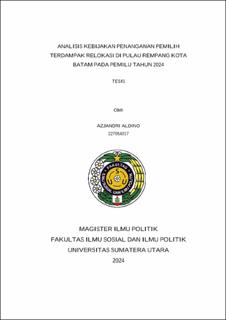Analisis Kebijakan Penanganan Pemilih Terdampak Relokasi di Pulau Rempang Kota Batam pada Pemilu Tahun 2024
Analysis of The Policy on Handling Voters in The Relocation Site of Rempang Island, Batam, in The 2024 General Election

Date
2024Author
Aldino, Azjandri
Advisor(s)
Zulkarnain, Iskandar
Fauzan, Indra
Metadata
Show full item recordAbstract
In the midst of the stages of the 2024 general election, the media has
reported about the Rempang Eco-city development project. Its impact is the
acquisilion of 7572 hectares of people's land. The relocation of voters from
Rempang Island directly affects the DPT (List of Definite Voters) designated by the
Balam KPU (General Election Committee). However, the natives of Rempang
Island cannot be moved through the process of DPTb since there is no regulation
for it, or to the TPS (Polling Station) due to the relocation. The objective of this
research is to find out the policy and the obstacles faced by KPU of Batam in
handling voters who have been relocated to Rempang Island, Batam, in the 2024
general election. The analysis on this policy uses David Easton 's theory, while the
analysis of the obstacles is explained generally, based on data and research results.
The research uses a descriptive qualitative method There are eight informants,
consisting of a key informant, main informant, and additional informants. The data
are collected by conducting observation, in-depth interviews in semi-structured
form, and documentation. The collected data are analyzed using data condensation,
data presentation, and conclusion drawing. The technique of data validation is
done using source triangulation technique. The result of the research shOlvs that
the input is about the demand for fixed TPS according to the input from the people
and the feedback on the people's good participation in using their voting rights.
The policy on handling voters relocated to Rempang Island in the 2024 general
election is responsive and adaptive to the people's needs. The policy is not only
effective but also adaptable to feedback and changes in the external environment.
The obstacles include regulatory, security, and administrative challenges.
Collections
- Master Theses [65]
